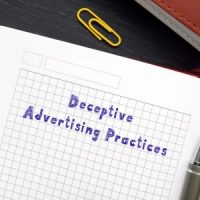False Advertising In Florida: Know The Definition And Your Legal Options

Advertising is everywhere. As all savvy consumers know-well, advertising is not independent or unbiased. An advertisement is trying to sell a product or service. Companies have a right to advertise. At the same time, you have a fair and reasonable expectation that an advertisement is making accurate representations. False advertising is an illegal, deceptive practice.
For victims of false advertising, the Florida Deceptive and Unfair Trade Practices Act (FDUTPA) provides one of the strongest legal remedies. Here, our West Palm Beach deceptive & unfair trade practices attorney explains the most important things to know about how false advertising is defined and what you can do to seek financial compensation if you were a victim.
Florida Defines False Advertising With Reference to Federal Law
Florida law, including the FDUTPA, is largely consistent with federal law on false advertising. As stated clearly by the Federal Trade Commission (FTC), there are rules and regulations in place regarding marketing and advertising. The basic rule of false advertising is as follows:
- Businesses are allowed to “puff up” their goods and services, but they are not permitted to use false, misleading, or deceptive statements to materially misrepresent goods or services to consumers.
What does that standard mean in practice? Companies can make broad statements to try to sell their products, but they must avoid making factually misleading claims about the goods or services that they are offering.
Understanding False Advertising through an Example
Imagine that you purchase internet services from a company in Palm Beach County, Florida. You enter a two year contrast. They advertised themselves as having “great” internet speed. If your internet turns out to be far slower than you expected, it might be difficult to bring a false advertising claim. The reason is that the term “great” is vague. No specific representation has been made.
On the other hand, imagine that in the same scenario the internet service provides a certain minimum upload speed and download speed. If your internet connection fails to meet that minimum speed, that is false advertising. The company made a specific claim to induce your purchase and failed to deliver.
False Advertising is Covered Under the FDUTPA
The FDUTPA is a consumer protection law that contains a private right of action. This means that you as a consumer (or a business) can file a lawsuit against a party that caused you actual harm through deceptive or unfair practice. Florida law is clear: False advertising is a covered violation under the FDUTPA. You can file an FDUTPA claim to seek compensation for damages suffered due false advertising.
Set Up a Confidential Consultation With Our South Florida FDUTPA Claim Attorney
At Pike & Lustig, LLP, we have the skills and legal experience to handle Florida Deceptive and Unfair Trade Practices claims. If you or someone you know sustained losses due to false advertising, we are here as a legal resource. Call us now to set up a confidential case review. From our law offices in West Palm Beach, Wellington, and Miami, we handle false claims act cases throughout South Florida.
Sources:
ftc.gov/news-events/topics/truth-advertising
leg.state.fl.us/statutes/index.cfm?App_mode=Display_Statute&URL=0500-0599/0501/0501PARTIIContentsIndex.html



